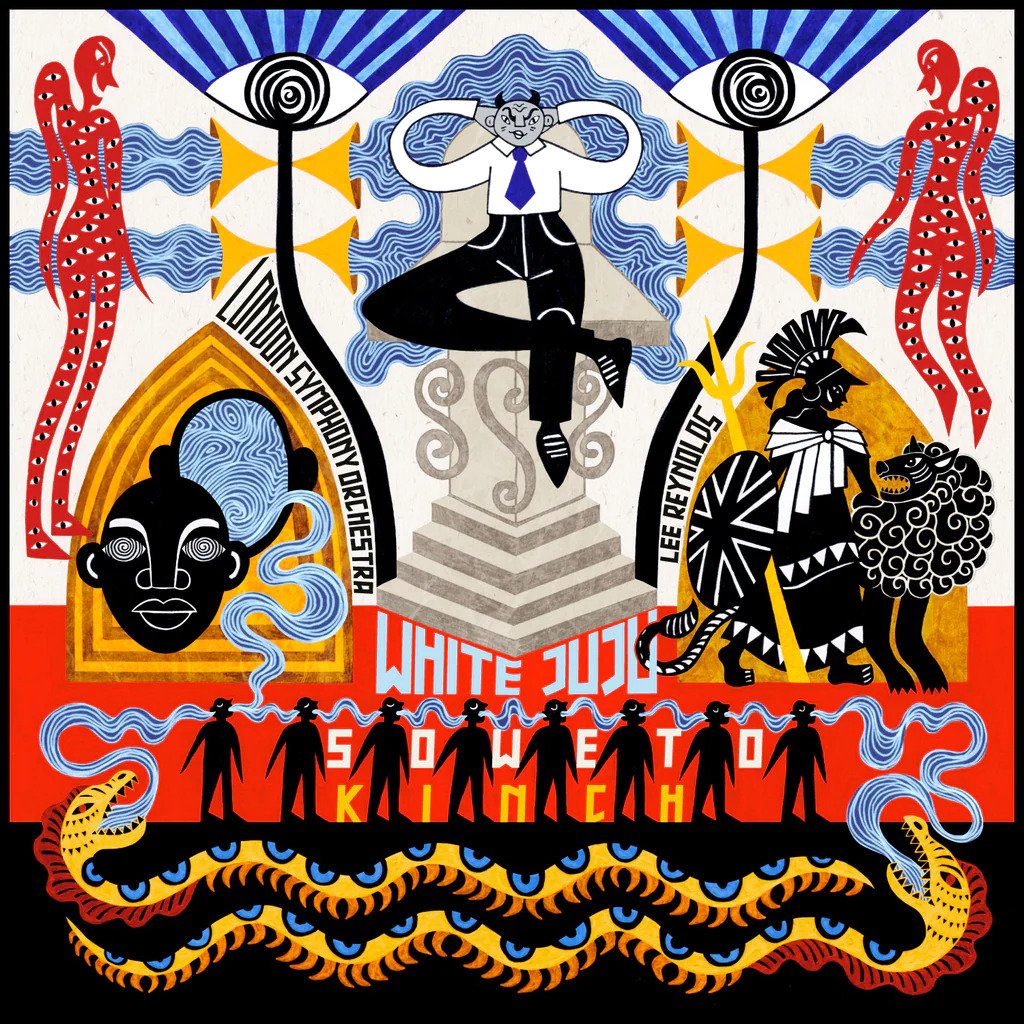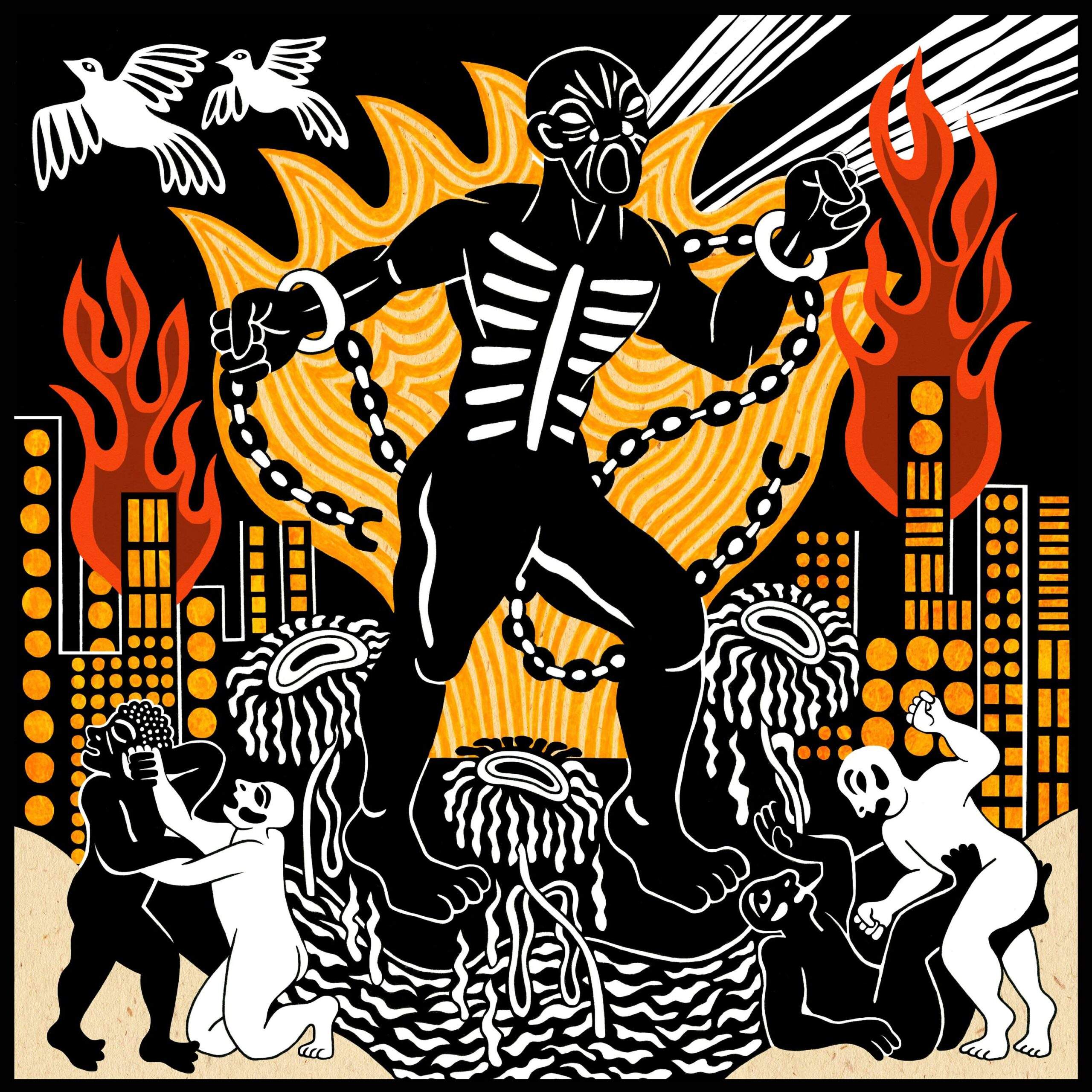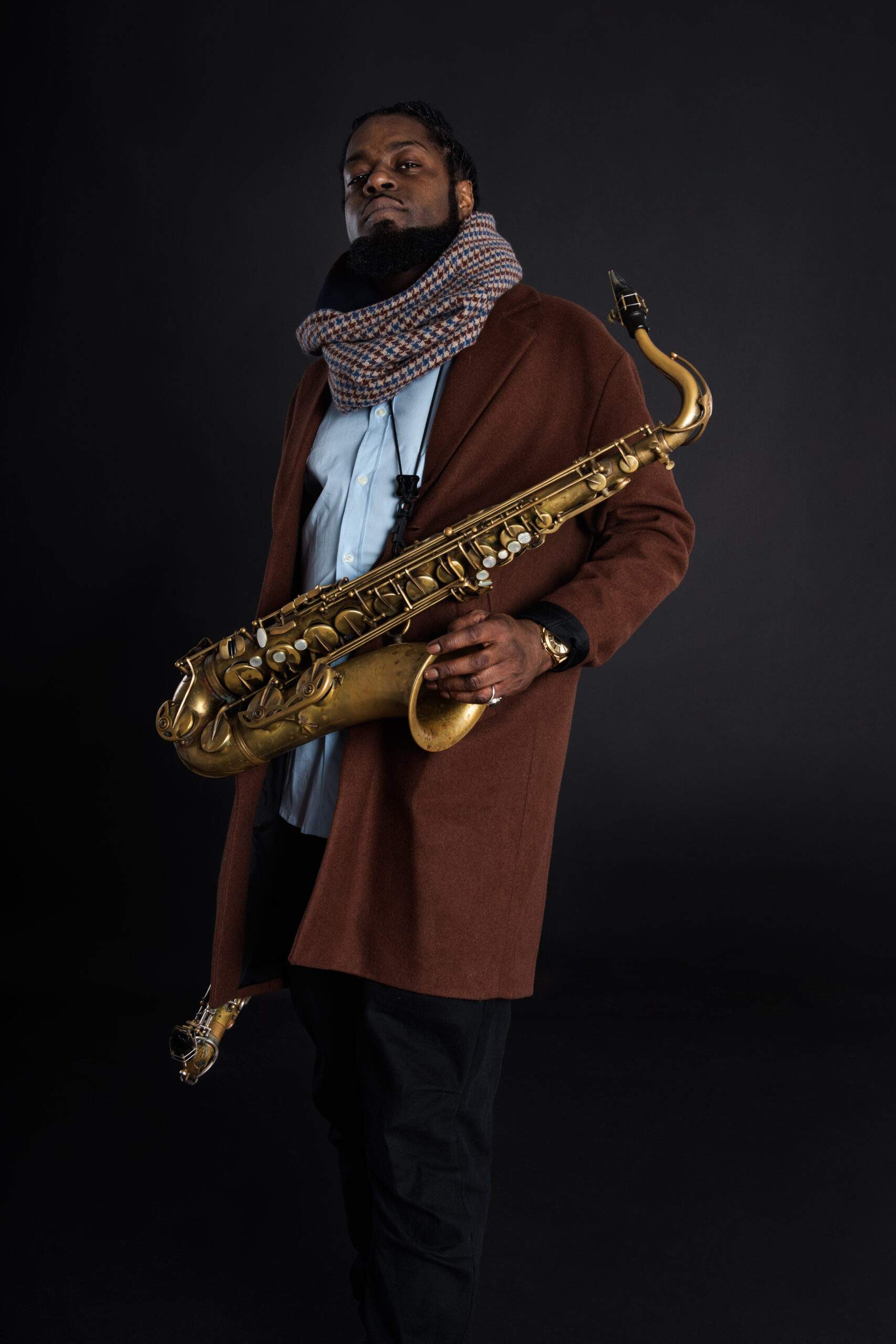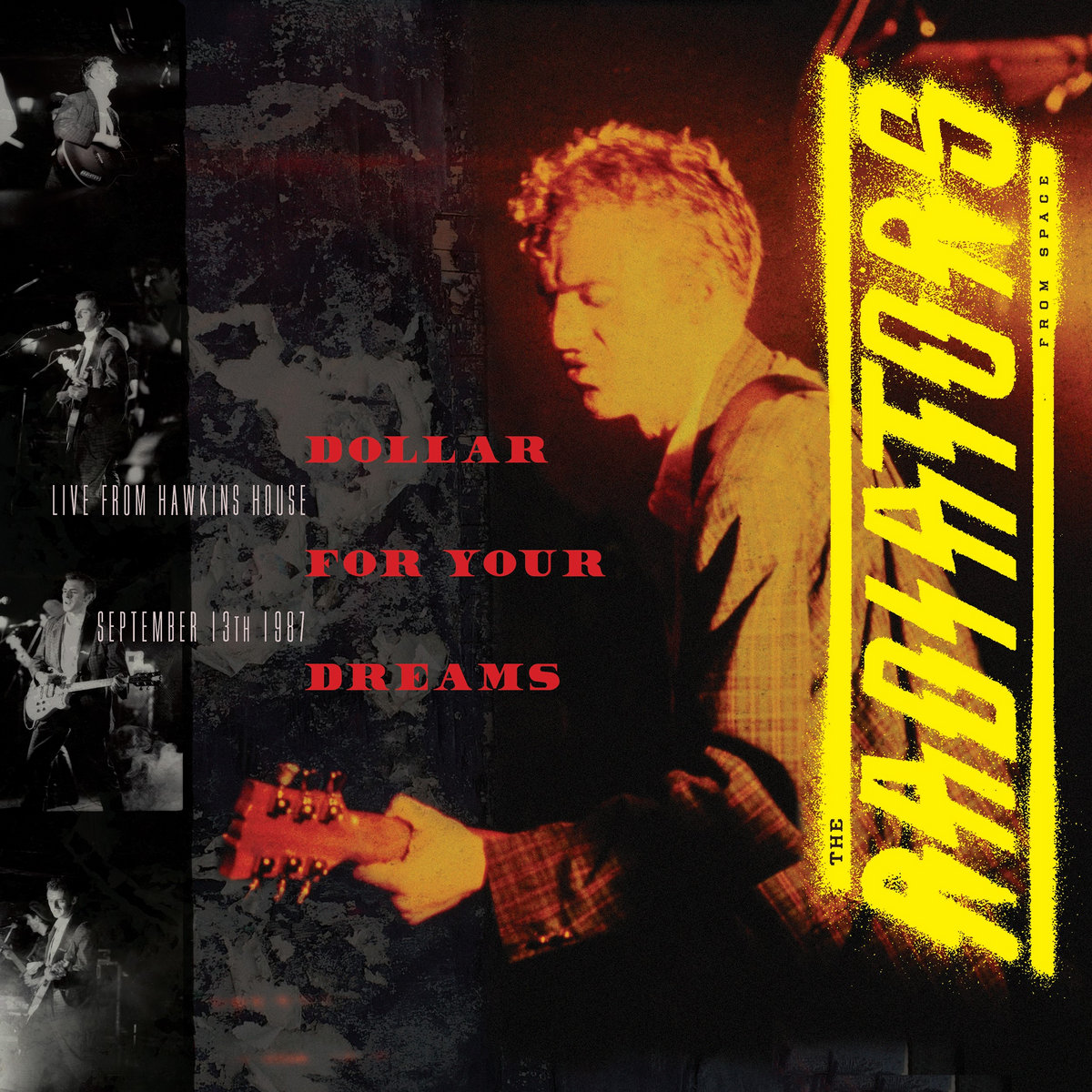Soweto Kinch | Interview | New Album, ‘White Juju’ featuring London Symphony Orchestra
‘White Juju’ is award-winning British saxophonist and rapper Soweto Kinch’s powerful new work for jazz quartet and symphony orchestra, written in response to lockdown, BLM, British history and the culture wars.
Towards the end of the first lockdown, Kinch visited Liverpool, Salford, Hull and Cardiff with a small group of musicians and dancers, staging a socially distanced version of ‘The Black Peril’ as an online festival. As he walked the streets, then denuded of pedestrians, he was immediately struck by imperial emblems, flags and statues in these British port cities—innumerable mock Elgin marbles, Queen Victoria statues, Union jacks and military monuments that, in the previous bustle of city life, went relatively unnoticed.
“It fascinates me how we’re all acquainted with an unspoken architectural and symbolic language of power” says Kinch. “How do these monuments or myths affect how we see ourselves as a nation? Naming the piece ‘White Juju’ deliberately inverted ideas of the “savage” or primitive. Perhaps the bizarre fetishes and obsessions of a cult religion are more visible in modern Britain than third world countries.”
‘White Juju’ will be made available on vinyl on Friday 14 April 2023 to coincide with Record Store Day on Saturday 15 April.

Award winning alto-saxophonist and MC Soweto Kinch is one of the most exciting and versatile musicians in both the British jazz and hip hop scenes. Recently, Kinch extended his work in music media, becoming the main presenter for BBC Radio 3’s Jazz Now, and fronting BBC Four documentary Jazzology (2018). He was further awarded an Honorary Associateship at Hertford College, Oxford (2018) and by the Royal Academy of Music (2020).
With an impressive discography that has covered a wide range of themes from the Seven Deadly Sins to slavery/emancipation, Kinch’s music has seen him tour extensively with his own ensembles as well as forging lasting collaborations from the US, India, to Australia and Sudan to Brazil. In 2013, Kinch presented a stage performance of his concept album ’The Legend of the Mike Smith’ at Birmingham Repertory Theatre. ’Nonagram,’ his 2016 release, explored sacred geometry and the healing properties of sound in an age of increasing division.
Kinch returned with a brand new studio album and live tour in 2019. ’The Black Peril’ debuted at a sold-out EartH, Hackney during the EFG London Jazz Festival 2019. A politically and racially-engaged body of work, historical inspiration for the record can be traced to the episodes of civil unrest that erupted across the western world throughout 1919. Despite the restrictions of quarantine, Kinch continued this work by staging an online festival #BlackPeril2020. It combined bespoke artistic collaborations with exciting black British musicians, choreographers and dancers such as Jade Hackett, Nathanial Cross, Hannah Mbuya and Tyrone Isaac-Stuart as well as lively discussions with established artists such as Lowkey, Jason Moran, Nicholas Payton.

“I wanted to channel all of the confusion and countervailing emotions”
You released maybe your most versatile recording so far, what sparked the idea to work with the orchestra?
Soweto Kinch: I was approached by the London Symphony Orchestra and London Jazz Festival back in 2019, to create an augmented version of ‘The Black Peril,’ an album based on the history of race riots 100 years ago. However, once lockdown happened, with all the ensuing chaos I realised I had to create something new to capture the extraordinary moment.
Would you like to share how you approached ‘White Juju’?
The concept ‘White Juju’ was really distilled throughout Summer 2020 to describe the ways in which division is orchestrated and much of the country kept spellbound by myths of racial superiority, and the memory of imperial grandeur. It was a way of explaining why our electorate seem intent on making suicidal choices.
It wasn’t until I did a socially distanced tour of port cities under lockdown that I really noticed the ubiquitous flags, statues and symbols which adorn our public spaces – and questioned their deleterious effects.
Musically, I wanted to channel all of the confusion and countervailing emotions of the time. Glorious nature walks, and spring weather vs Covid deaths, PPE scandals and cronyism. Time for edifying reading and home bakes vs doom-scrolling tweets, abuses of police power and powerlessness.

We are living in a very uncertain time, do you see ‘White Juju’ as a direct response to the times?
‘White Juju’ is very much a response to the times. Whilst I think the white juju necromancers of yesteryear laid statues and obelisks to inculcate their social/racial values; today media magnates and big tech are the vanguard of sowing social division and racial animus.
We’re all slightly more alert to the ways in which algorithms drive engagement through negativity and division, but we’re only just comprehending how destructive to our political and social cohesion it has become.
How pleased were you with the sound of your album?
I’m really pleased with the sound of this album. It was difficult to capture all of the nuance in a live Barbican performance, but working with the London Symphony Orchestra and Tony Platt meant that I captured the rawness of a live show as well the expansive and detailed writing for the ensemble. I was really satisfied with the way the music toggles between assonant grooves and discordant free jazz, again capturing something of the disorientating experience of lockdown.
Do you discover new aspects of your songs developing in front of an audience?
It felt as though the audience shared a very personal journey with me. I don’t think I discovered “new aspects,” but in creating something highly individual and specific it chimed with a lot of the audience. I didn’t expect a standing ovation! It felt like having a sonic archive of all of the chaos, beauty and corruption of lockdown was a cathartic experience for us all.
On a piece like ‘The Natural Order,’ I was able to play with a musical shorthand for “the establishment” subverting an audience’s expectations, by having pomp and circumstance-esque music, contrasted by footage of decaying Britain – mountains of dead pigs, and metric tonnes of sewage being dumped into our rivers.
How do you usually approach music making? Do you have a certain process or it depends on the situation?
It very much depends on the situation. But with this project I was able to benefit from much more time without the glut of live touring dates. My approach was based on really trying to capture the complex emotions and epiphanies of the time.
What other musical activities have you undertaken lately?
It’s been a rollercoaster return to live work in 2022. I’ve just returned from a week in Montreux, and played a number of dates with my trio. I’m also preparing to take some version of ‘White Juju’ to San Francisco in Spring 2023.
What are some of the most important players that influenced your own style and what in particular did they employ in their playing that you liked?
It’s hard to distill my love and admiration of so many influential players into one or two. But I was very inspired by the work of Max Roach and Abbey Lincoln, ‘Freedom Now We Insist!’.
There’s something to be said for uncompromising work which approaches themes we’re all thinking but few are bold enough to call-out.
What are some future plans for you?
Can’t wait to perform this piece again in London on the 16th March 2023 at Printworks.
Let’s end this interview with some of your favourite albums. Have you found something new lately you would like to recommend to our readers?
Really can’t think of anything, tbh. But I’m really excited to hear other orchestral works created by Ayanna Witter-Johnson and Cassie Kinoshi during this period. I’m fascinated to hear how we all approached these unique times and working with a large ensemble differently.

Thank you. Last word is yours.
I’m reminded listening to the recording that although it was a sold-out performance, in November 2021 I never had a chance to hear the audience’s visceral and immediate response – as we were still in semi-lockdown. The aisles had to be cleared almost immediately, and we returned to a quasi-lockdown.
It’s really special now to be able to hear an audience’s responses – hear how much it chimed and also to realise the subject of ‘White Juju’ is still very relevant today. I can’t wait to hear more responses from listeners of either bewilderment or agreement.
Klemen Breznikar
Soweto Kinch will perform new album ‘White Juju’ with the London Symphony Orchestra at Printworks on 16th March 2023 (link)
Soweto Kinch Official Website / Facebook / Instagram / Twitter / YouTube




